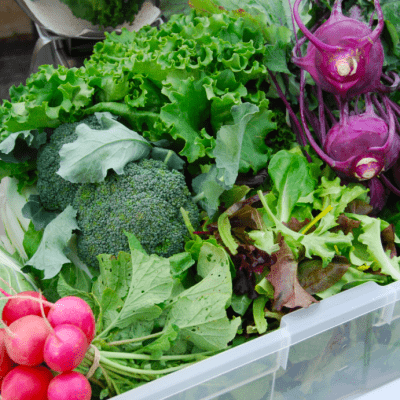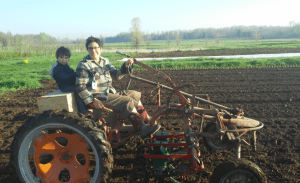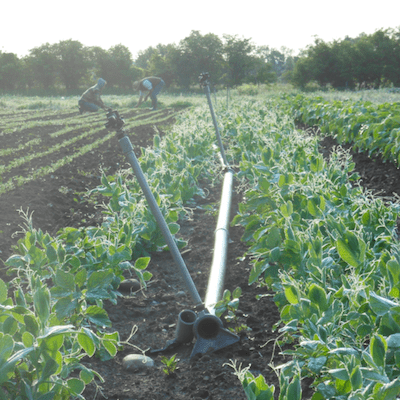Written by Victoria Lesy, Matt Orton, Abdul-Rahim Abdulai, Nicole Unterlander, Abigail Van Reisen from the Arrell Food Institute, University of Guelph; in collaboration with Thorsten Arnold, Ecological Farmers Association of Ontario.
This story is part of a series of case studies documenting the experience of 6 EFAO member farmers as they adapt to climate change on their farms.
Leslie Moskovits and her partner Jeff Boesch operate Cedar Down Farm, a 6-acre market garden located outside of Neustadt. The farm is a certified organic year-round operation, growing a variety of vegetables in fields and greenhouses. Through a CSA (Community Supported Agriculture) model, they serve families in Guelph and the surrounding areas of Hanover and Port Elgin. Cedar Down Farm has been operating for 10 years now; a period long enough to observe changes in weather conditions at the local level. Despite not having decades of experience to draw on, Leslie still points us to what she has seen as yearly variations:
“We have been farming about 15 years. We moved to this farm 10 years ago. We just notice that the weather is pretty variable. So we’ve had pretty dry seasons followed by [a] really wet season, really hot seasons followed by [a] pretty cold season. So, yeah we definitely have observed variability year to year.”
With this variability, Leslie believes that precipitation has become more localized. The more local and variable climate becomes, the more challenges it poses to farmers. Leslie describes some of her experiences dealing with difficult weather conditions: “Yeah, occasionally we will have…especially too dry seasons. The weather is really hot and dry and we have experienced a reduction in yields from our crops.” Cedar Down Farm minimizes losses with irrigation. But, “for us, it’s impossible to irrigate quite the same as having regular rainfall.” Leslie and Jeff have also dug a larger pond to increase water storage for dry periods, partly to prevent exposure of weakened plants to pests. The inability to spray due to organic certification requirements means that Leslie needs to go the extra mile to remain resilient.
Besides the challenges posed by dryness, Leslie has to deal with challenges from wetness: “yeah there’s definitely years… last year was the year that we would not be able to enter the farm because it was too wet.” This situation again requires responsiveness, and that is what Leslie continues to do. For Leslie, farming is about finding the right balance. In this case, by relying on the strengths of diversity and ecological approaches:
“Because of the way we farm we are able to offset some of the risks because we don’t only grow a single crop. By having a dozen crops we are not quite as affected if we lose one, while others are not affected at all! If we cannot get into the field one week or another, it will affect one single crop or a few rows of crops.” Diversification has worked well for Leslie and Jeff because it reduces the risk of overdependence on one revenue source.

One of Cedar Down Farm’s CSA boxes. Growing a variety of products means a lower financial risk – in a tough season where crops may fail, relying on just one or two could be disastrous. (Cedar Down Farm)
Another form of diversification employed by Cedar Down Farm is their marketing strategy. The use of CSA has proved vital to keeping the farm on track. The CSA model provides some level of security as it “offsets the kind of risks [that] other farming and distribution models” are prone to. Important to the pivotal role of CSA for Leslie is its ability to reduce climate-related stress that could drive some farmers into psychological issues, as they face uncertainties regarding cash flow and the bottom line at the end of the season. Another thing with the CSA is that “there’s a social element which is that you’re trying to […] establish many relationships with consumers and get more committed to you… that you’re not at the risk of a dramatic loss in a season that will affect your ability to farm in the future.”
Leslie and Jeff go beyond just responding to changes in one specific aspect of the farm; they take a holistic approach to countering systemic stress like climate change, largely through the on-farm and off-farm strategies noted in this piece. “For us, climate variability is a big part of why we farm the way we do.” For Leslie, it is important to acknowledge climate change and respond accordingly: “Do we believe in climate change? Yes, of course, I mean, you have to believe that conditions may be a little worse.” So, the CSA and diversified farming, among other strategies, interplay to ensure they effectively respond to the changing climate they perceive may worsen over time. If people ‘go out of their comfort zones’ to try these ecological approaches to farming, there is no reason it may not work for others if done right, she believes. Leslie also emphasizes the need for farmers to be part of a strong community that creates opportunities to learn from one another.

Leslie with her son Asher on the tractor. (Cedar Down Farm)

